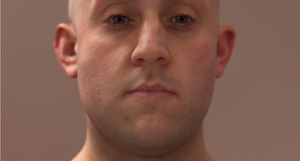Information
- Publication Type: Master Thesis
- Workgroup(s)/Project(s):
- Date: January 2015
- TU Wien Library:
- First Supervisor:
- Keywords: subsurface scattering, real-time
Abstract
This thesis proposes extensions for the Separable Subsurface Scattering algorithm to support arbitrary materials. Four separable (rank-1) kernel models for the approximation of physically based diffuse reflectance profiles are presented. Each model offers different approximation quality and controllability. The first two models are based on singular value decomposition and a custom analytic pre-integration scheme. They enable fast deterministic kernel computation and provide fixed-quality solutions. Two additional parametrized models are based on automatic and manual optimization and provide more control over the approximation quality but are more time-consuming to generate. Higher rank approximations can be computed using the approach based on singular value decomposition. All four kernel models are used to compute approximations for physically measured diffuse reflectance profiles of different materials and tested using several special-case irradiance signals and complex proof-of-concept scenes. The results are compared to the state of the art in realtime rendering of subsurface scattering, showing comparable approximation quality at lower computational cost. The proposed extensions enable rendering of physically based subsurface scattering for arbitrary materials and dynamic scenes in real time.https://www.youtube.com/watch?v=P0Tkr4HaIVk
Additional Files and Images
Weblinks
No further information available.BibTeX
@mastersthesis{Freude_MSc,
title = "Extending Separable Subsurface Scattering to Arbitrary
Materials",
author = "Christian Freude",
year = "2015",
abstract = "This thesis proposes extensions for the Separable Subsurface
Scattering algorithm to support arbitrary materials. Four
separable (rank-1) kernel models for the approximation of
physically based diffuse reflectance profiles are presented.
Each model offers different approximation quality and
controllability. The first two models are based on singular
value decomposition and a custom analytic pre-integration
scheme. They enable fast deterministic kernel computation
and provide fixed-quality solutions. Two additional
parametrized models are based on automatic and manual
optimization and provide more control over the approximation
quality but are more time-consuming to generate. Higher rank
approximations can be computed using the approach based on
singular value decomposition. All four kernel models are
used to compute approximations for physically measured
diffuse reflectance profiles of different materials and
tested using several special-case irradiance signals and
complex proof-of-concept scenes. The results are compared to
the state of the art in realtime rendering of subsurface
scattering, showing comparable approximation quality at
lower computational cost. The proposed extensions enable
rendering of physically based subsurface scattering for
arbitrary materials and dynamic scenes in real time.
https://www.youtube.com/watch?v=P0Tkr4HaIVk",
month = jan,
address = "Favoritenstrasse 9-11/E193-02, A-1040 Vienna, Austria",
school = "Institute of Computer Graphics and Algorithms, Vienna
University of Technology ",
keywords = "subsurface scattering, real-time",
URL = "https://www.cg.tuwien.ac.at/research/publications/2015/Freude_MSc/",
}


 poster
poster thesis
thesis

